SlashGear Review: LaCie's Ethernet Disk Mini, Low-Cost Multi-Function NAS
Backup is boring, let's admit it, but a shiny chunk of Network Attached Storage can lend a little of its new-toy glee to the procedure. My time with LaCie's Ethernet Disk mini might not exactly be the stuff of fairy-tales – boy meets NAS, boy falls in love with NAS, boy takes NAS home – but despite mixed first-impressions you'll be pleased to hear there's a happy ending.
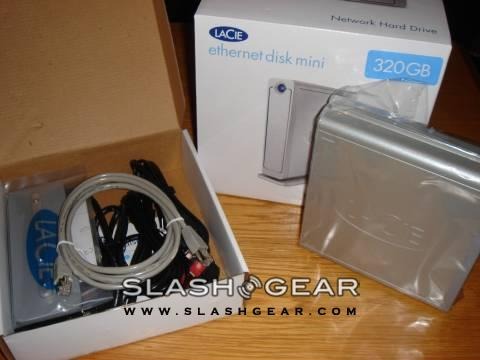
The Ethernet Disk mini is available in three sizes – 250GB, 320GB and 500GB – with prices starting at £129 and peaking at £169 in the UK, while in the US only the latter two are available for $180 and $210 respectively. That gets you a single-drive in a rugged aluminium caddy, gigabit ethernet or USB 2.0 connectivity (as well as both the cables to hook it up), and a USB 2.0 host port allowing for an extra hard-drive to be added or a digital camera to be connected directly. It's a compact box, measuring 1.7 x 6.3 x 6.8 inches, but a heavy one (3.3lbs) thanks to that all-metal construction. The only other physical aspects of note are the illuminated power button on the front, which flashes when data is transferring, and the small grill at the back for the quiet cooling fan.
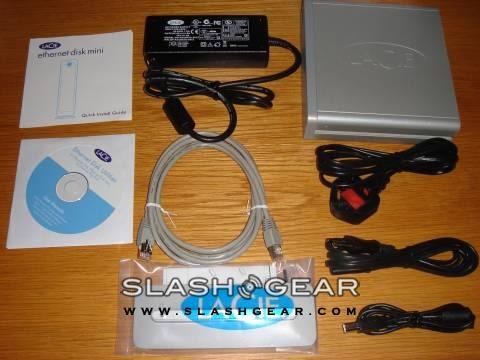
Setup was a mixed bag, in fact a bag containing two Ethernet Disks. My router is set to automatically assign IP addresses via DHCP, and the first LaCie sent me would connect initially but drop the link after an hour or two, requiring a power-cycle before the ethernet port would be recognised again. Contacting LaCie technical support was a disappointment, since they failed to respond to my email and have no publicised telephone helpline; eventually their PR department replaced the unit.
Since both were boxed, plastic-sealed and shop fresh, I can only assume the first drive was faulty from production; in such circumstances it would be the responsibility of your supplier to replace it, which would hopefully free you from attempting communication with LaCie's mysterious technical support department. The replacement has consistently worked without trouble, and I have no reason to suspect it will behave otherwise as time progresses.
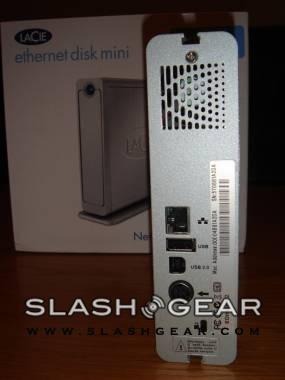
LaCie bundle an IP configurator program on CD, which can be run to identify which address the router has assigned. Surprisingly, even though I knew which IP the drive was using, I couldn't go directly to it until the configurator had done its magic. Going by the documentation the software does nothing but scan the network, which makes that behaviour confusing; still, the average home user is used to running an installation disk and would certainly not be disappointed with that LaCie provides. A copy of the company's own '1-Click' Backup Software is also included.
Logging into the Ethernet Disk via its local webpage, you're presented with a list of shared folders and an option to access the administrative section. There, the wealth of LaCie's customisation becomes clear: the drive can act as a file server for Windows, Linux or Mac (supporting SMB and AFP systems), as an FTP file server, a multimedia server with UPnP streaming, or as an HTTP webserver. Each function can be independently configured or switched off; for instance, certain directories can be established as music, video or image stores to be streamed via UPnP. Multiple users can be set up, each with varying degrees of access and read/write privileges to multiple shared folders, or alternatively the Disk left as one big pooled resource. Space is handled dynamically and cannot be limited for each share or user, so network administrators looking for a way to portion up storage may have to look elsewhere.
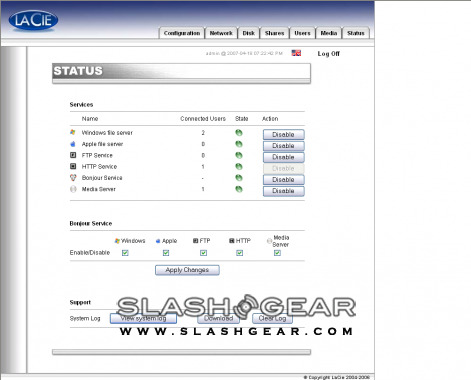
After setting up, all that's left is to start transferring files. Now, like most people, my router only has 10/100 ethernet ports, as does my laptop, so I was unable to make the most of the gigabit speed the drive will support. However, if anything it's a more real-world report of performance given the relative rarity of 10/100/1000 routers on the market. Copying 2GB of files from laptop to Ethernet Disk took 8m 15sec; copying them back took a minute more than that. All being said, once you've backed up your whole computer then doing incremental backups won't particularly trouble the clock ; similarly, the drive can serve up a variety of mp3 and mpeg4 content using UPnP and direct file-shares to multiple computers without skipping or dropped frames.
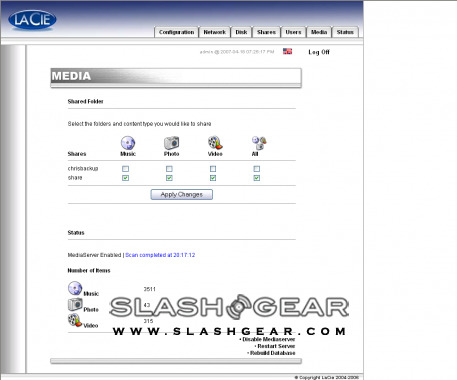
It's obvious to use the Ethernet Disk as, well, a disk attached to your ethernet, but LaCie also provide direct USB support and it'd be churlish of me not to try it. Here things get a little strange; although it's a standard USB 2.0 port, the drive won't show up as a normal mass storage device. Instead you need to install software which creates a USB network interface, with your computer acting as a DHCP server. It works, but it's not the most elegant of solutions and it adds an extra degree of complexity to swapping the drive between PCs or taking it into work to steal valuable industrial secrets. You're also required to have administrative privileges, on XP at least, to install the software; not such an issue on a home PC but it leaves you at the mercy of whatever draconian network admin might lurk around your office.
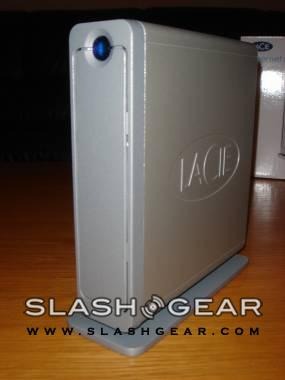
Still, aside from testing it once I've not used the USB option at all, since ethernet is where the LaCie shines. It's relatively quiet, usually only the hum of the hard-drive (which frustratingly never spins-down) making itself known, and the aluminium shell and dinky, temperature-controlled fan work well in keeping it cool. UPnP support might not sound like much, but it makes the LaCie compatible with a growing number of media adaptors such as the Terratec NOXON iRadio I've previously reviewed. It would make a great way to distribute entertainment around the home, especially with an upgrade to a gigabit, Draft-N router that could make the most of the drive's capacity.
Not supporting printer sharing is a small blot on the Ethernet Disk's record, but the ability to plug in a supplemental hard-drive or, as I did, a USB memory stick and have it instantly recognised and ready as another shared drive makes up for it. My overwhelming experience, despite the faulty drive I was initially sent, has been positive; perhaps the biggest complement you can give a gadget is paying for it out of your own pocket, and that's just what I intend to do.
Many thanks to LaCie UK for the loan of the Ethernet Disk mini
